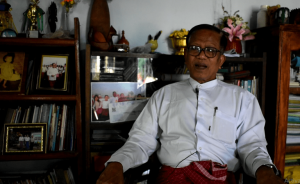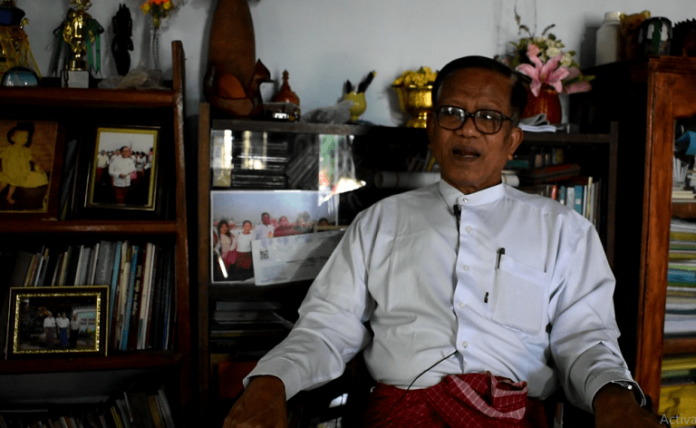Recently, MNA’s Editor Nai Banyar Aung, interviewed Nai Hongsar, Chair of New Mon State Party (NMSP) regarding the current peace process in Myanmar. Here is an excerpt from that interview.
Question: What should be done regarding the Arakan Army (AA) and other groups in the Northern Alliance?
Answer: We welcome the fact that there is no fighting between the AA and Tatamadaw. We are very much pleased that their fighting has halted. What we want is that all fighting be stopped, and [disputes]l should be handled in a political manner.

The Tatmadaw’s standpoint is that only after inking the National Ceasefire Agreement (NCA) can the Ethnic Armed Organizations (EAOs) participate in the peace talks. But the Northern Alliance does not accept some parts of the NCA accord.
My view is to be able to include them [Northern Alliance], we will first compromise. We should have the approach that enables everyone to participate in the talks, and not leave any group behind. For example, let it be a [compromise on the matter] of them not yet signing the NCA].
But when we discuss the peace matters, if they also accept the decisions, this issue will then be solved. We do not want some other factors [that can advance peace] to be stopped. If it is necessary for them to sign, they [the Tatmadaw] should negotiate with them. If some points needed to be amended, they should do so.
Question: What should be done to make the current peace process more effective and successful?
Answer: We believe no EAOs should be left out, all armed groups should be welcomed into the peace talks. Such things should be done that way, and this is because only if all groups participate, will there be peace all across the country. We should work forward to have all groups participate with patience in nationwide peace talks. We have proposed for all-inclusiveness from the beginning.
Question: What are the factors that are blocking the peace dialogue?
Answer: What is preventing or [blocking dialogue] is the Tatmadaw’s drafted 2008 constitution. They [Tatmadaw] do not want to give up their power. What is more, it is the Tatmadaw’s 6 requirements of the peace policy. That means laws will be only amended in the Hluttaw [parliament], [which their Constitution gives them greater power], and that is how they control it. To summarize, the barriers all depend on [resolving] these factors.
Question: What has been discussed regarding the unification of the army?
Answer: We have discussed it before. We ethnic armed organizations (EAOs) have accepted the single army, in accordance with the policy. But how the Tatmadaw will be reformed remains the question.
According to the 2008 Constitution, the current Tatmadaw, the police, militia, and all EAOs fall under the Tatmadaw’s control. The Tatmadaw also holds key minister positions in the government, and it controls 25% at the Hluttaw.
This is not in accordance with democracy. It is also necessary to have guarantees for the EAOs, [such as having control] of our army as a state security force. That is what we proposed.
But the Tatmadaw did not accept that. It will be discussed and adjusted by the government and Tatmadaw, but any [changes will be done by them]. They told us that these changes do not concern the EAOs. So, we did not continue that discussion.
Question: Do you have a final message to share with our readers?
Answer: The current armed conflict will not be stopped without a true federal union, that supports true national equality and self-determination.
Those currently in power are talking about democracy as their priority. But they do not seem to like talking about federalism. If we keep moving this way, the civil war will not end, and it will [drive us] further away from ethnic unity. So, I want to urge everyone that if you love your country and have sympathy for the public, let’s work for and implement the federal union as soon as possible.

